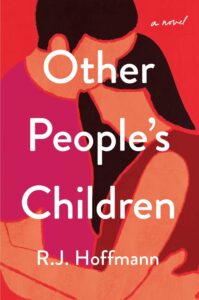My wife and I completed our family through adoption, so perhaps it was inevitable that my debut novel, Other People’s Children, tells the story of an adoption gone awry. Our son and our daughter both came home without much drama, but we weren’t spared the endless waiting, the razor’s-edge uncertainty, and the flood of love when we first met our children. Adoption is such an emotional and sometimes fraught experience for everyone involved—the birth parents, the adoptive parents, and as they grow up, the children. When things go well, when everyone cooperates in good faith, it just changes everyone’s life forever. When things go wrong, when circumstances slide toward the gray or into the black, well, that’s a different story.
Stories. Narratives. That’s just it. A healthy adoption is full of them, all viscerally important. The story of why the birth mother wasn’t able to raise the child or chose not to. The story of the adoptive parents’ decision to adopt. The origin story that the children create for themselves or with the help of their parents. The story of the delicate dance of an open adoption. The story that pries at the mysteries of fate and destiny and choice that brings a child to a family that they weren’t born into.
Literature is chock full of orphans, from the early days of the novel (Bronte and Dickens) straight through to Lila by Marilyn Robinson and The Dearly Beloved by Cara Wall. Often, the themes of orphans and adoption thrum in the background of a story, creating a bass line of tension that the rest of the story resonates against. Disney has made billions by separating children from their birthparents. Nemo loses his mother and several hundred siblings before the opening credits are finished. Don’t get me started on the trigger warnings that Universal Studios should place on Despicable Me. Books that center on adoption often tip toward intrigue, deception, the impunity of privilege, and worse. In the best of these, the tension becomes tuned to a higher pitch altogether.
Here’s a few to check out.
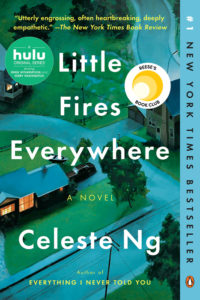
Little Fires Everywhere, by Celeste Ng
The novel opens with the Richardson house ablaze from an apparent arson. Accelerant was employed. Little fires were set throughout the house. The themes of race, privilege, and family serve as kindling for the story. In the background, an immigrant from China first abandons her infant daughter in desperation, and then struggles to regain custody from the wealthy, white friends of the Richardsons who have adopted her. The whole town of Shaker Heights, Ohio weighs in, and the adoptive family applies all the leverage that money can buy. Meanwhile, in the foreground, Elena Richardson serves as a surrogate mother for Pearl Warren, while her own daughter, Izzy finds a surrogate in Pearl’s mother, Mia. Both women chafe, even as Ng slow-burns a literal surrogacy crisis.
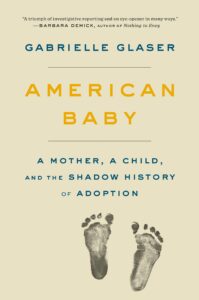
American Baby: A Mother, a Child, and the Shadow History of Adoption, by Gabrielle Glaser
Today’s adoption laws and practices center on the rights of the birth parents and the rights of adoptees to know those birth parents. Glaser shows us why. She expertly weaves the real-life story of Margaret Erle Katz and her son David Rosenburg with a history of the unscrupulous workings of the American adoption industry during the middle of the twentieth century. David, conceived by unmarried teenage sweethearts, was all but stolen from Margaret to feed the demand of infertile couples during the post-war baby boom. Virtually unregulated, those adoption agencies, in pursuit of money and prestige, threatened, humiliated, and coerced unwed mothers into relinquishing their babies. With closed adoptions the norm, it was virtually impossible for the birthparents and adopted children to reconnect, and American Baby tallies the trauma for both.
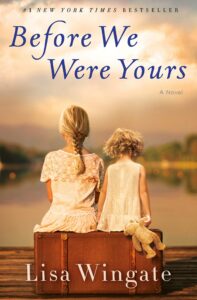
Before We Were Yours, by Lisa Wingate
Wingate takes us from the present to the past and back again as she weaves a tale of multi-generational mystery fueled by a shady adoption mill. In the present, Avery, the daughter of a South Carolina senator quits her job as a federal prosecutor to return home when her father becomes sick. He fights colon cancer, and she may have to step into his political shoes. Her Grandma Judy suffers from dementia and slips unpredictably from the past to the present. In Tennessee, at the end of the depression, Rill Foss and her five siblings lose their mother to childbirth, and because the family is poor, they are snatched from their father by the authorities. They are shuttled to the infamous Memphis orphanage run by Georgia Tann (a real-life villain plucked from history), where they suffer abuse before being placed with the highest bidder. When Avery is accosted by an old woman in a nursing home, and when that woman steals Grandma Judy’s bracelet from Avery’s wrist, these two stories inexorably become one.
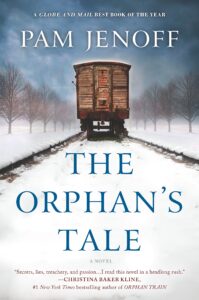
The Orphan’s Tale, by Pam Jenoff
Noa, a Dutch teenager, becomes pregnant by a Nazi soldier occupying her city. Her parents shun her, and when her baby is born, it is taken from her and placed with a German family. She finds herself living above a train station when a train car full of Jewish babies headed to a concentration camp pulls in. Many of the babies are already dead, but one near the door is alive. Overwhelmed by thoughts of her own lost child, she takes him, and runs. She finds her way to the winter training grounds of a traveling circus where she and her ‘brother’ are taken in by Astrid, a trapeze artist, and her partner, Peter. When the circus travels to occupied France, secrets emerge, pressure is applied, and their trust in each other is tested. Will the relationships holding together this unconventional family survive the crucible within which they find themselves trapped?

Never Ask Me, by Jeff Abbott
Danielle Robert’s dead body is found in a quiet suburban park, throwing Lakehaven, an affluent Austin suburb, into an uproar. An adoption consultant, Hannah helped dozens in the community to adopt from overseas, including her neighbors, the Pollitts. Everyone loved Danielle, and everyone struggles with her death, even as they begin to suspect each other of her murder. Everyone loved Danielle… but motives sprout like dandelions in Lakehaven’s manicured lawns. It becomes clear that Grant Pollitt’s adoption story is more complicated than most, and it becomes tangled with the story of Danielle’s death. Only one person is guilty, but few prove innocent.
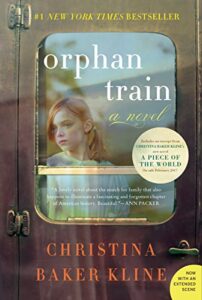
Orphan Train, by Christina Baker Kline
Molly is a rebellious seventeen-year-old foster child, struggling to stay at yet another humiliating placement. When she’s caught stealing a library book (Bronte, by the way) and finds herself sentenced to fifty hours of community service, she stumbles across Vivian, a ninety-one-year-old widow living in a stately mansion with an attic that needs organizing. We learn that Vivian is an orphan, too, sent west from New York City just before the Great Depression on an ‘orphan train’, the early twentieth century’s answer to foster care. Memories emerge from the boxes in the attic, and as Molly pries the past from Vivian, they learn how much they have in common. The crimes against them, even the many that didn’t break the letter of the law, help prepare both for what comes next.
***
